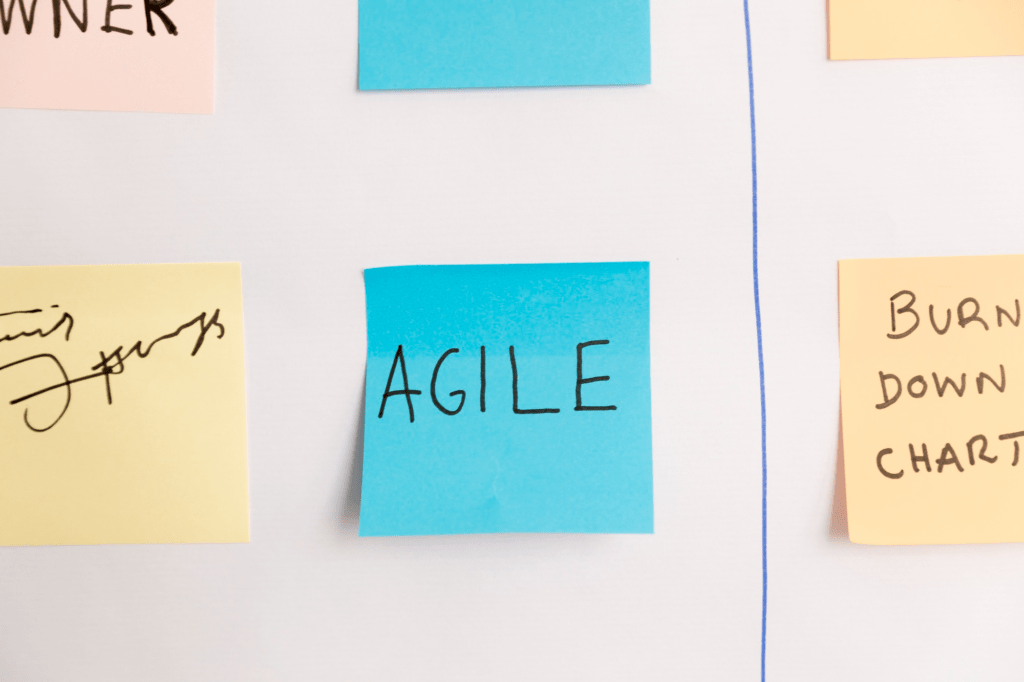How much do you know about the lean agile mindset?
As an entrepreneur, you’re probably familiar with many of the business and technology trends shaping the new normal. Trying to stay updated can be exhausting. You’re bombarded with information on a daily basis, which often creates additional stress and overload.
The lean agile mindset is a business tool that could vastly simplify your life – and transform your business.
Lean vs Agile: A Marriage of Opposites
If you’re even vaguely familiar with the business philosophies of Lean and Agile thinking, you might feel a little confused because they seem almost like opposites when you take them at face value. They’re both powerful and effective – but different. Maybe you’ve already adopted a lean team approach to doing business, but there’s more you can do to successfully apply both mindsets to your business.
Defining Lean and Agile Thinking
The philosophy or operating process you use in your business very often depends on what product or service you offer. Regardless of industry, there are some overarching tools that you’ll find applied almost universally. Why? Because they amplify results, and those who ignore them risk getting left behind.
So, how does the Lean mindset compare with the Agile mindset?
Characteristics of Lean Business Thinking
You could summarize the Lean mindset as a system focused on greater productivity and increasingly better quality. If you look for a comparison in the auto industry, you could use Toyota as an example. The company’s Kaizen philosophy of fast, continuous improvement pretty much summarizes the Lean mindset. Here are some key characteristics:
1 . Eliminate Multitasking
You probably already know how badly productivity is affected when employees multitask. Here, you foster a culture of hyper-focus, where everyone is a specialist – in a way. Their main task is to ensure consistency and look for improvement, no matter how small. You discourage them from cross-skilling or straying from their lane.
2 . Raise the Bar
This speaks to an almost fanatical focus on finding ways to increase results. You’d focus on better production times, for example. You’d search for ways to lower costs and streamline processes. Again, think of a Toyota production line here.
3 . Minimize Wastage
For this, you’d police two things: resources and time. Obviously, you’d want to waste as little material, energy, or human resource as possible. You’d also want to cut down on time spent on tasks, searching for ever-increasing production speed.

Characteristics of Agile Business Thinking
So, the Lean mindset is concerned primarily with efficiency. In contrast, how does the Agile mindset differ? You could probably think of the Agile mindset as being more a more organic approach. So, if someone wants a gold-plated champagne bucket fitted in their Rolls Royce, it can certainly be done, ma’am.
1 . Quality Over Speed
The emphasis here is on delivering a product or service that is bespoke, carefully crafted. It’s almost a weird paradox, but the ‘slow food’ movement is actually an example of the Agile mindset! The key to better quality, in Agile terms, is to move slowly and thoughtfully in business. This seems counterintuitive, but consider the approach taken by people like Warren Buffet and Charlie Munger.
2 . Customer as a Collaborator
As a business owner, you might see your customers as allies or even resources. But the Agile mindset demands that you view customers as co-creators. This means you should constantly and directly involve your customers in your creative process.
3 . No Sacred Cows
Because the Agile mindset says that nothing is written in stone, you’re free to ignore tradition or supposed established fact. Especially if you find a better solution. If something doesn’t work for you, toss it.
4 . Empowerment and Reassurance
To achieve Agile goals, you want your team to be highly motivated. And so, this means you should demolish hierarchies and embrace a truly egalitarian business culture. Because everyone has a voice, and their insights are welcomed – even if they’re not always flattering.
10 Lean Agile Attributes to Practice and Teach
The key word here is ‘attributes’. These are mental models and skills rather than hard-nosed business tools. And that’s why you can embrace and teach them, often almost informally. Here are 10 ways to combine two seemingly opposing mindsets:
A Culture of Constant Learning
Here, you want to be open minded to new possibilities. In the lean agile mindset framework, you take nothing for granted. In fact, you need to be prepared for the fact that some of your most cemented opinions or beliefs could be outdated- or wrong.
Pragmatic Optimism
By being optimistically focused on an outcome, you open your mind to better solution-based thinking. You also see problems as temporary challenges rather than massive obstacles. And this attitude is contagious. You want to infect your entire team with it!
Incremental and Measurable Progress
Imagine trying to climb two ladders. One has rungs that are 4 feet apart, and the other has rungs only one foot apart. If you can get up one rung on the first ladder, it’s great progress – but it takes huge effort, and you can slip. It’s much easier to simply climb up four shorter rungs.
In the same way, steady incremental wins are habit-building, and easier to accomplish – with the same result.
Team Dynamics
In the lean agile mindset model, team input is highly valuable. Because with quality people alongside, you can build a hive mind that leads to better ideas and faster progress. Allow mavericks their space – but emphasize the power of a smart group over a smart individual.
Minimizing Distractions
When you’re in the lean agile mindset, you want to operate as economically as possible. But more than finances, this refers to clutter and distraction. Learn how to reduce complexity in business and develop laser-like focus on every project.
Be Experimental
Be open to any and all ideas, no matter how stupid or outrageous they may sound. And so, if you encourage your team to brainstorm without judgement, you’ll be surprised at what springs from these sessions.
Fail Forward
Lose your fear of failure. Yes, ‘fail forward’ is almost a cliche, but it’s the only way to test the actual limits of what you’re doing. In the gym, muscles are built at the point of failure – and business is no different!
A Culture of Accountable Autonomy
Forget about tightly centralized authority structures. In the lean agile mindset model, you want to empower every individual as much as possible. Do it almost to the point of discomfort – but require trustworthiness and integrity in return.
Optimize Process Flow
Continually look for ways to streamline the flow of information, production, and service. Get rid of non-essential procedures. Redeploy people if you have to. Ditch things that take up too much time or mental bandwidth. Here, simpler is way better.
Respect Differences
Always remember that your business isn’t a faceless entity. It’s comprised of humans, and it serves humans. And so, if your teams are taught to respect differences and to uphold the dignity of others, you gain workplace harmony and happier customers. You also cultivate more insightful and thoughtful team members.
A Powerful Combination
It’s a military maxim that in combat, you can either move quickly or move quietly – but you can’t do both at the same time. With the lean agile mindset model, though, you can move quickly and efficiently by applying ‘slow’ mindfulness to progress. If you’re an entrepreneur, the lean agile mindset is an obvious win-win model to contemplate for your business.
Freeing Up Your Teams
You can enhance the focus and flow of your teams by having someone coordinate and oversee projects for you. A virtual assistant is an ideal addition – with none of the typical corporate overheads.
Book a discovery call today, claim your free trial, and see just how cost-effective and efficient a virtual assistant can be.





